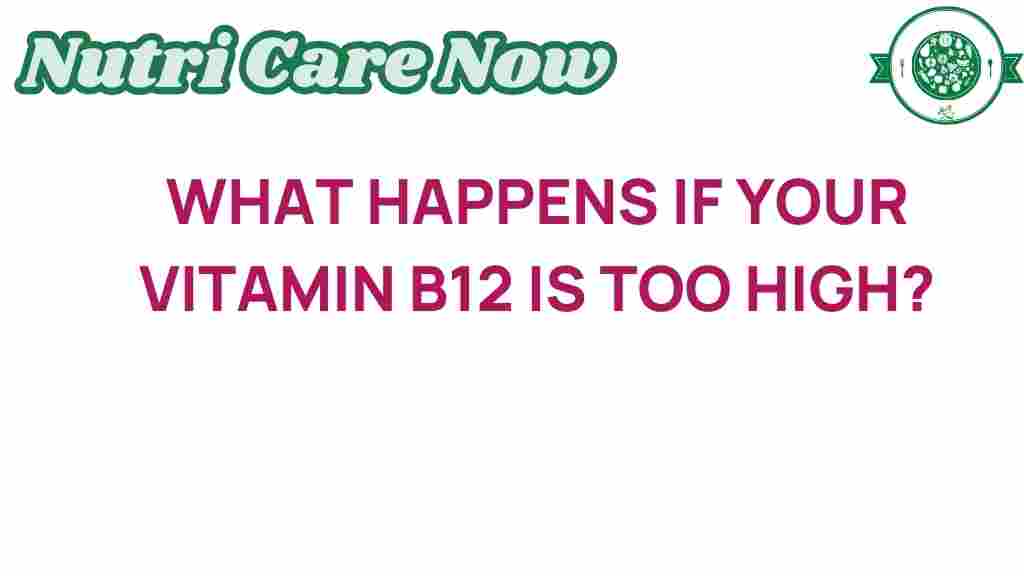The Surprising Effects of Excess Vitamin B12 on Your Health
Vitamin B12 is an essential nutrient that plays a crucial role in various bodily functions, including the formation of red blood cells, DNA synthesis, and nerve function. While many people focus on the risks associated with vitamin B12 deficiency, less attention is paid to the potential health risks of excess vitamin B12. In this article, we’ll explore the effects of high vitamin B12 intake, how it can impact your health, and the importance of maintaining dietary balance.
Understanding Vitamin B12
Vitamin B12, also known as cobalamin, is a water-soluble vitamin found mainly in animal products such as meat, fish, eggs, and dairy. It is vital for:
- Maintaining healthy nerve cells
- Producing DNA
- Supporting red blood cell formation
- Preventing megaloblastic anemia
While it is crucial for wellness, the body can store significant amounts of vitamin B12, which raises questions about the effects of excess intake from supplements or fortified foods. Understanding how to achieve a healthy balance is essential in nutrition.
Sources of Vitamin B12
Vitamin B12 is primarily obtained from animal-based foods. Some common sources include:
- Beef, liver, and poultry
- Fish and shellfish
- Dairy products like milk, cheese, and yogurt
- Eggs
- Fortified cereals and plant-based milk alternatives
Vegetarians and vegans may be at a higher risk of deficiency and often rely on supplements or fortified foods to meet their vitamin B12 needs. However, excessive supplementation can lead to health risks that are often overlooked.
What Happens with Excess Vitamin B12?
While vitamin B12 is generally considered safe and non-toxic due to its water-soluble nature, excessive intake can lead to some health risks. Here are some of the surprising effects of high blood levels of vitamin B12:
- Potential for Acne and Rosacea: High levels of vitamin B12 have been linked to skin conditions, including acne and rosacea. Research suggests that excess vitamin B12 can alter the skin’s microbiome, leading to breakouts.
- Kidney Issues: Excessive vitamin B12 may put stress on the kidneys, especially in individuals with pre-existing kidney conditions. Maintaining healthy blood levels is crucial for those at risk.
- Interactions with Medications: High doses of vitamin B12 can interfere with the effectiveness of certain medications, including those for diabetes and chemotherapy drugs.
- Neuropathy: Some studies have suggested that excessive vitamin B12 could lead to nerve damage, particularly in those with underlying health issues.
Health Risks of Vitamin B12 Excess
While severe toxicity from vitamin B12 is rare, understanding the health risks associated with excess vitamins is essential. Here are some specific health risks of high vitamin B12 levels:
- Cardiovascular Issues: Some studies indicate that high levels of vitamin B12 may be associated with an increased risk of cardiovascular problems, particularly in older adults.
- Increased Risk of Certain Cancers: There is ongoing research into the relationship between elevated vitamin B12 levels and certain types of cancer, such as lung cancer.
- Potential for Methylation Issues: Excess vitamin B12 may affect the body’s methylation processes, which can have various downstream effects on health.
Maintaining Appropriate Blood Levels
To avoid the health risks associated with excess vitamin B12, it’s essential to maintain appropriate blood levels. Here are some steps to achieve that:
1. Regular Testing
Consider having your vitamin B12 levels checked regularly, especially if you are on supplements or have a dietary restriction that may affect your intake.
2. Monitor Dietary Intake
Be mindful of your consumption of both natural food sources and supplements. Aim for a balanced diet that meets your nutritional needs without excessive supplementation.
3. Consult with a Healthcare Professional
If you suspect you are not getting enough vitamin B12 or are concerned about excess intake, consult with a healthcare provider or a registered dietitian for personalized advice.
Dietary Balance and Nutrition
Achieving nutritional balance is vital for overall health. Here are some tips:
- Focus on Whole Foods: Prioritize whole foods rich in nutrients rather than relying solely on supplements.
- Include a Variety of Foods: Incorporate a wide range of foods in your diet to ensure you get all the necessary vitamins and minerals.
- Be Cautious with Supplements: Use supplements judiciously and only when necessary, as over-reliance can lead to imbalances.
Troubleshooting Vitamin B12 Intake
If you experience symptoms that may indicate excess vitamin B12 or deficiency, consider these troubleshooting tips:
1. Monitor Symptoms
Keep track of any changes in your health, including skin issues, fatigue, or neurological symptoms. This can help you and your healthcare provider determine if adjustments are needed.
2. Adjust Supplementation
If you are taking vitamin B12 supplements, discuss with your healthcare provider the possibility of adjusting your dosage to maintain optimal levels.
3. Explore Dietary Alternatives
If you are concerned about excess intake from supplements, explore dietary sources of vitamin B12 that can provide a more balanced intake.
Conclusion
While vitamin B12 is essential for health and wellness, it is crucial to understand that excess vitamin B12 can lead to various health risks. Maintaining appropriate blood levels and dietary balance is key to reaping the benefits of this vital nutrient without facing adverse effects. Regular testing, monitoring dietary intake, and consulting with healthcare professionals can help manage your vitamin B12 levels effectively. For more information on nutrition and maintaining a healthy lifestyle, visit this resource.
Remember, achieving optimal health is all about balance. Be mindful of your vitamin B12 intake to support your overall wellness.
This article is in the category Supplements and created by NutriCareNow Team
